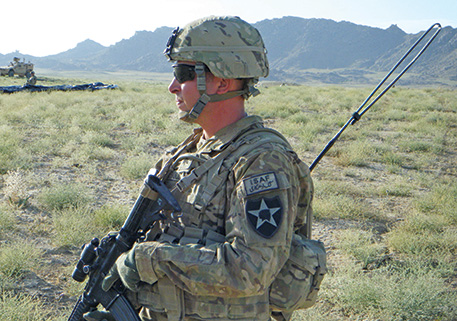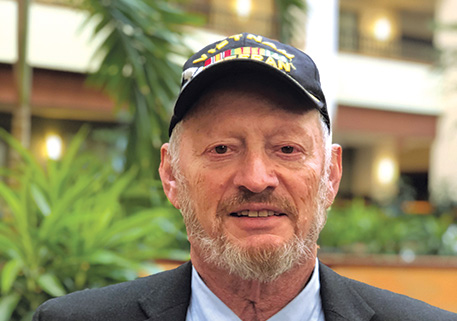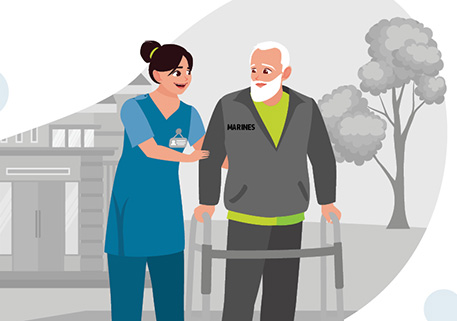Miracles return to the mountain
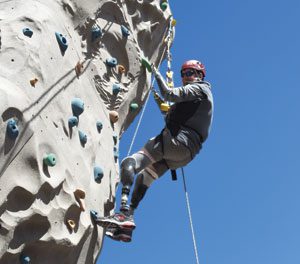
DAV National Commander Dave Riley believed his life of adrenaline and adventure was over when he woke up in the hospital after losing all four of his limbs, but that all changed in the mountains in Snowmass, Colo.
In 1997, the elite Coast Guard rescue swimmer contracted septic shock pneumococcus sepsis, resulting in the amputation of his arms and legs and removal of several internal organs. Through a challenging physical and emotional journey, Riley went on to fulfill many of his goals: obtaining his bachelor’s and master’s degrees in computer science and serving as an analyst at a successful tech company. He continued to have the love and support of his wife (turned caretaker) and their three children, but there remained a void in his life.
It wasn’t until Riley took part in the National Disabled Veterans Winter Sports Clinic in 2010 that he discovered what was missing. At the clinic, the largest rehabilitative program of its kind in the world, Riley rediscovered skiing and other adaptive sports like sled hockey, fly fishing, scuba diving, curling, kayaking and rock climbing.
A self-described adrenaline junkie, he was hooked. This year, he returned for a seventh time.
“This event changes lives, and in my case, saves lives,” explained Riley. “I went through a period of a great depression, and the ability to challenge myself once again and enjoy life through adaptive sports was invaluable.”
This year’s clinic, co-hosted by DAV and the Department of Veterans Affairs, brought together more than 375 participants, 200 ski instructors and 1,000 volunteers.
“This event is truly a partnership between DAV and VA, but we could not do it alone. Each sponsor and volunteer plays an important role in bringing ‘miracles to the mountain,’” said National Voluntary Services Director John Kleindienst. “The participants who descend upon Aspen with their determination drive and inspire everyone involved.”
“The National Disabled Veterans Winter Sports Clinic is a life-changing event,” said VA Secretary Dr. David J. Shulkin. “I am inspired by our veterans and equally inspired by our staff, who coach and encourage them to dream beyond their imagination, draw from their inner strength and use this clinic to showcase their resilience and courage.”
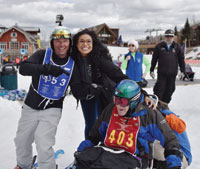

VA Interim Deputy Secretary Scott Blackburn attended this year’s clinic and even tested out a mono-ski.
“It was amazing,” said Blackburn. “I was a little scared; this was my first time skiing sitting down. But as we got going, I could see that I could relax, and I loved it.”
DAV ambassador and multiplatinum recording artist Jordin Sparks also came out to support veterans in Snowmass. She joined participants in various adaptive sporting activities, including a game of sled hockey, getting a taste of the camaraderie and spirit of the event as well as the grit and determination of the veterans participating.
For many veterans, the clinic is not only an introduction to these rehabilitative sports but also an opportunity to chart progress in their recovery.
Navy veteran Dana Liesegang first attended the clinic in 1993 just a year after her medical discharge from the military. At the age of 19, Liesegang was sexually assaulted and subsequently thrown off a 75-foot cliff, sustaining a severe traumatic brain injury, spinal cord injury and damaged internal organs.
“This event is my gauge for improvement. I work hard every year and continue to set goals,” said Liesegang, who had set a long-term goal of becoming a clinic coach.
At the clinic’s 30th anniversary last year, Liesegang arrived to Snowmass as an instructor.
“I wanted to give back,” explained Liesegang, a DAV life member. “This clinic has been a driving force behind my progress. Sometimes it is hard to see incremental improvements, but when you come up here you can make leaps and bounds from one year to the next.”
Liesegang, who refuses to let her injury define her, encourages other ill or injured veterans to try out adaptive sports.
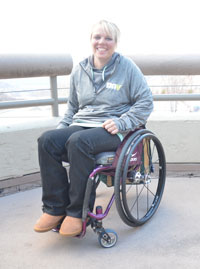

“Here at Snowmass, there are people all around you with various injuries at different stages of recovery,” explained Liesegang. “You’re going to find someone who was in your shoes at one point. All you have to do is look around you, watch them and realize if they can do that, you can, too.”
For first-time participants like Marine Corps veteran Wade Spann, the clinic can also be a reminder of the support network available throughout the recovery process.
Spann, an Iraq War veteran, said he was in awe of the vast number of people and resources required to make the event possible for him and other participants.
“It was very humbling,” said Spann. “The volunteers came together with unique skills and a common goal of ensuring veterans were taken care of and experienced growth and confidence building.”
After Spann took off his uniform, he pushed his past behind him—including painful memories of the Marines he deployed with who did not return—and buried himself in work and school, a practice he thinks is all too common for veterans.
“The past few years I became more idle and retrospective, and that in turn gave me the self-realization to re-evaluate my past and address issues from service,” said Spann, who sustained shrapnel to the back of his head after his unarmored Humvee was struck by an improvised explosive device. “If you simply put the past behind you and don’t address it in a therapeutic manner, it compounds a lot of things in your life. You can run from it, but it will catch up to you.”
Spann, a DAV life member, said he looks forward to returning to the clinic. “It recharged my batteries; it was a rewarding experience.”
For thousands of veterans over the years, the clinic has represented an opportunity to push limits and test abilities.
While Jeff Glasser was on recruiting duty shortly after graduating from boot camp, the Army veteran was struck by a vehicle when the driver ran a stop sign. In an instant, his dreams of an infantry career were over, and Glasser struggled to come to terms with what life after a spinal cord injury would look like.
Though Glasser had taken up hand cycling, scuba diving and even skydiving years after his injury, something was missing. His wife, Celia, encouraged him to try the clinic, and he finally attended in 2014. With one trip down the mountain on a bi-ski, Glasser found what was missing in his life. He quickly moved on to the more challenging mono-ski.
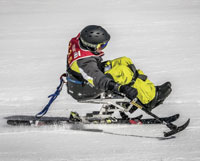

“It was exactly what he was looking for,” said his wife, who also serves as his caretaker. “He wanted an adrenaline-charged sport, and with skiing, he found that.”
The clinic served as a catalyst for Glasser, and in the three years since first ascending the mountains, he has continued to train and travel to other events to pursue the sport. Skiing is more than just rehabilitation for Glasser; it has become a staple for his family, including 5-year-old daughter Madeline.
“I want to be the best as I can be on the slopes,” explained Glasser. “But it’s even more important for my family. It is something we can enjoy together. It also teaches my daughter about the service and sacrifice of veterans.”
Glasser’s physician, Dr. Kevin White, who has trekked to Colorado for the past decade to serve on the clinic’s medical team, received part of his training through the VA and decided to make serving veterans his career. He said this is his way of giving back.
“Oftentimes when my patients are initially injured, they don’t understand that they can still do everything they wanted to do—and more,” said White. “This clinic shows veterans that despite their injuries, they can still be active. They can ski, kayak and more. There’s no limitations.”
That sentiment is not lost on participants. Whether their first time or seventh, veterans leave the mountain with much more than when they arrived.
“The clinic illustrates that regardless of illness or injury, the only limits disabled veterans have are the ones we place on ourselves,” said Riley.




